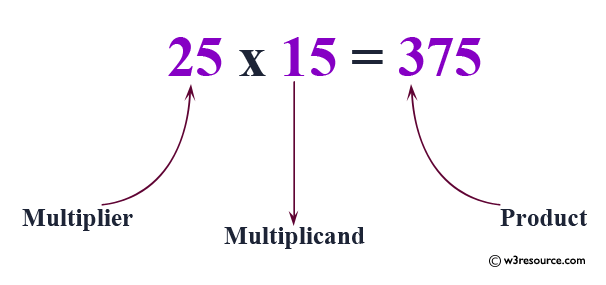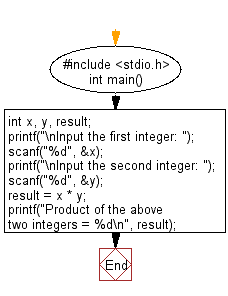C Exercises: Calculate the product of the two integers
C Basic Declarations and Expressions: Exercise-10 with Solution
Write a C program that accepts two integers from the user and calculate the product of the two integers.
Pictorial Presentation:

C Code:
#include <stdio.h>
int main()
{
int x, y, result;
printf("\nInput the first integer: ");
scanf("%d", &x);
printf("\nInput the second integer: ");
scanf("%d", &y);
result = x * y;
printf("Product of the above two integers = %d\n", result);
}
Sample Output:
Input the first integer: 25
Input the second integer: 15
Product of the above two integers = 375
Flowchart:

C Programming Code Editor:
Contribute your code and comments through Disqus.
Previous: Write a C program that accepts two integers from the user and calculate the sum of the two integers.
Next: Write a C program that accepts two item’s weight (floating points' values ) and number of purchase (floating points' values) and calculate the average value of the items.
What is the difficulty level of this exercise?
Test your Programming skills with w3resource's quiz.
C Programming: Tips of the Day
Static variable inside of a function in C
The scope of variable is where the variable name can be seen. Here, x is visible only inside function foo().
The lifetime of a variable is the period over which it exists. If x were defined without the keyword static, the lifetime would be from the entry into foo() to the return from foo(); so it would be re-initialized to 5 on every call.
The keyword static acts to extend the lifetime of a variable to the lifetime of the programme; e.g. initialization occurs once and once only and then the variable retains its value - whatever it has come to be - over all future calls to foo().
Ref : https://bit.ly/3fOq7XP
- New Content published on w3resource:
- HTML-CSS Practical: Exercises, Practice, Solution
- Java Regular Expression: Exercises, Practice, Solution
- Scala Programming Exercises, Practice, Solution
- Python Itertools exercises
- Python Numpy exercises
- Python GeoPy Package exercises
- Python Pandas exercises
- Python nltk exercises
- Python BeautifulSoup exercises
- Form Template
- Composer - PHP Package Manager
- PHPUnit - PHP Testing
- Laravel - PHP Framework
- Angular - JavaScript Framework
- Vue - JavaScript Framework
- Jest - JavaScript Testing Framework
